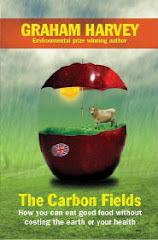Methane - a greenhouse gas - is said by scientists to be 20 times more powerful than carbon dioxide as a driver of global warming. Every cow produces up to 200 litres of the stuff a day - equivalent in its climate change effect to a 33-mile Land Rover Freelander journey.
We look forward to letting you know the findings of this research but in the meantime why not read my article on the subject from the Comment is Free website in July 2007. Click here to read the full article - Pastures new.
"Alongside our house on Exmoor we have a small, steeply-sloping pasture field known locally as The Cliff. The gradient is so lethal that no one's ever dared venture on it with a tractor. This means that - unlike most grass fields in Britain - it has never been dosed with weedkillers or nitrate fertilisers.
As I look out on the field it's currently bathed in a rare burst of summer sunshine. In the unaccustomed brightness the green sward looks a real picture. From hedgerow to hedgerow it's flecked with wild flowers - mostly white clover, rough hawkbite and the low-growing birdsfoot trefoil, known to the locals as bacon-and-egg.
A commercial farmer glancing over the hedge would shake his head in pity. The field looks more like the subject of a Constable painting than a serious place to produce food. Yet our small flock of Exmoor sheep seem to thrive on it. And in summer - when we get one - the sward comes alive with grasshoppers, bees and flickering butterflies.
Before the days of chemical agriculture, pasture fields across Britain were full of wild flowers and herbs. Old-style livestock farmers believed it was these everyday plants that kept their animals healthy. Pasture plants were thought to be rich in essential minerals and vitamins from which grazing animals could select the diets that suited them - and, presumably, which aided digestion."



No comments:
Post a Comment